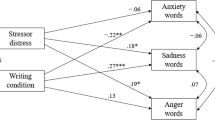Abstract
The effects of two journaling interventions, one focusing on emotional expression and the other on both cognitive processing and emotional expression, were compared during 1 month of journaling about a stressful or traumatic event. One hundred twenty-two students were randomly assigned to one of three writing conditions: (a) focusing on emotions related to a trauma or stressor, (b) focusing on cognitions and emotions related to a trauma or stressor, or (c) writing factually about media events. Writers focusing on cognitions and emotions developed greater awareness of the positive benefits of the stressful event than the other two groups. This effect was apparently mediated by greater cognitive processing during writing. Writers focusing on emotions alone reported more severe illness symptoms during the study than those in other conditions. This effect appeared to be mediated by a greater focus on negative emotional expression during writing.
Similar content being viewed by others
References
Donnelly DA, Murray EJ: Cognitive and emotional changes in written essays and therapy interventions.Journal of Social and Clinical Psychology. 1991,10:334–350.
Lepore SJ: Expressive writing moderates the relation between intrusive thoughts and depressive symptoms.Journal of Personality and Social Psychology. 1997,73:1030–1037.
Pennebaker JW, Beall SK: Confronting a traumatic event: Toward an understanding of inhibition and disease.Journal of Abnormal Psychology. 1986,95:274–281.
Pennebaker JW, Kiecolt-Glaser JK, Glaser R: Disclosure of traumas and immune function: Health implications for psychotherapy.Journal of Consulting and Clinical Psychology. 1988,56:239–245.
Pennebaker JW, Colder M, Sharp LK: Accelerating the coping process.Journal of Personality and Social Psychology. 1990,58:528–537.
Greenberg MA, Stone A A: Emotional disclosure about traumas and its relation to health: Effects of previous disclosure and trauma severity.Journal of Personality and Social Psychology. 1992,63:75–84.
Greenberg MA, Wortman CB, Stone AA: Emotional expression and physical health: Revising traumatic memories or fostering self-regulation?Journal of Personality and Social Psychology. 1996,71:588–602.
Esterling BA, Antoni MH, Fletcher MA, Margulies S, Schneiderman N: Emotional disclosure through writing or speaking modulates Epstein-Barr virus antibody titers.Journal of Consulting and Clinical Psychology. 1994,62:130–140.
Petrie KJ, Booth RJ, Pennebaker JW, Davison KP, Thomas MG: Disclosure of trauma and immune response to a hepatitis B vaccination program.Journal of Consulting and Clinical Psychology. 1995,63:787–792.
Smyth JM: Written emotional expression: Effect sizes, outcome types, and moderating variables.Journal of Consulting and Clinical Psychology. 1998,66:174–184.
Rachman SJ: Emotional processing.Behavior Research and Therapy. 1980,18:51–60.
Scheff TJ:Catharsis in Healing, Ritual, and Drama. Berkeley: University of California Press, 1979.
Lepore SJ, Ragan JD, Jones S: Talking facilitates cognitive-emotional processes of adaptation to an acute stressor.Journal of Personality and Social Psychology. 2000,78:499–508.
Calhoun LG, Tedeschi RG: Posttraumatic growth: Future Directions. In Tedeschi R, Park C, Calhoun L (eds),Posttraumatic Growth: Positive Changes in the Aftermath of Crisis. Mahwah, NJ: Lawrence Erlbaum Associates, Inc., 1998, 1–22.
Langston CA: Capitalizing on and coping with daily events: Expressive responses to positive events.Journal of Personality and Social Psychology. 1994,67:112–125.
Pennebaker JW, Mayne TJ, Francis ME: Linguistic predictors of adaptive bereavement.Journal of Personality and Social Psychology. 1997,72:863–871.
Lutgendorf SK, Antoni MH: Emotional and cognitive processing in a trauma disclosure paradigm.Cognitive Therapy and Research. 1999,23:423–440.
Tedeschi RG, Calhoun LG: The posttraumatic growth inventory: Measuring the positive legacy of trauma.Journal of Traumatic Stress. 1996,9:455–471.
Ort K, Sheridan JF, Robinson-Whelen S, et al.: The reliability and validity of a structured interview for the assessment of infectious illness symptoms.Journal of Behavioral Medicine. 1995,18:517–529.
Francis ME, Pennebaker JW:LIWC: Linguistic Inquiry and Word Count, Technical Report. Dallas, TX: Southern Methodist University, 1993.
Pennebaker JW, Francis ME: Cognitive, emotional, and language processes in disclosure: Physical health and adjustment.Cognition and Emotion. 1996,10:601–626.
Baron RM, Kenny DA: The moderator-mediator distinction in social psychological research: Conceptual, strategic, and statistical considerations.Journal of Personality and Social Psychology. 1986,51:1171–1182.
Affleck G, Tennen H, Croog S, Levine S: Causal attribution, perceived benefits, and morbidity after a heart attack: An 8-year study.Journal of Consulting and Clinical Psychology. 1987,55:29–35.
Davis CG, Nolen-Hoeksema S, Larson J: Making sense of loss and benefiting from the experience: Two construals of meaning.Journal of Personality and Social Psychology. 1998,75:561–574.
Mendola R, Tennen H, Affleck G, McCann L, Fitzgerald T: Appraisal and adaptation among women with impaired fertility.Cognitive Therapy and Research. 1990,14:79–93.
Bower JE, Kemeny ME, Taylor SE, Fahey JL: Cognitive processing, discovery of meaning, CD4 decline, and AIDS-related mortality among bereaved HIV-seropositive men.Journal of Consulting and Clinical Psychology. 1998,66:979–986.
Hollon SD, Kriss MR: Cognitive factors in clinical research and practice. Clinical Psychology Review. 1984,4:35–76.
Janoff-Bulman R: Assumptive worlds and the stress of traumatic events: Applications of the schema construct.Social Cognition. 1989,7:113–136.
Horowitz MJ:Stress Response Syndromes (2nd Ed.). New York: Jason Aronson, 1986.
Foa EB, Steketee G, Rothbaum BO: Behavioral-cognitive conceptualizations of post-traumatic stress disorder.Behavior Therapy. 1989,20:155–176.
van der Kolk BA: The body keeps the score: Memory and the evolving psychobiology of posttraumatic stress.Harvard Review of Psychiatry. 1994,1:253–265.
van der Kolk BA, van der Hart O: The intrusive past: The flexibility of memory and the engraving of trauma.American Imago. 1991,48:425–454.
Herbert TB, Cohen S: Stress and immunity in humans: A meta-analytic review.Psychosomatic Medicine. 1993,55:364–379.
Kiecolt-Glaser JK, Fisher L, Ogrocki P, et al.: Marital quality, marital disruption, and immune function.Psychosomatic Medicine. 1987,49:13–34.
O'Leary A: Stress, emotion, and human immune function.Psychological Bulletin. 1990,108:363–382.
Lutgendorf SK, Antoni MH, Kumar M, Schneiderman N: Changes in cognitive coping strategies predict EBV-antibody titre change following a stressor disclosure induction.Journal of Psychosomatic Research. 1994,38:63–78.
Costa PT, McCrae RR: Neuroticism, somatic complaints, and disease: Is the bark worse than the bite?Journal of Personality. 1987,55:299–315.
Author information
Authors and Affiliations
Additional information
We are grateful to John Harvey for his assistance in conducting this study. We also thank James Pennebaker for analyses of journals with the Linguistic Inquiry and Word Count program.
About this article
Cite this article
Ullrich, P.M., Lutgendorf, S.K. Journaling about stressful events: Effects of cognitive processing and emotional expression. ann. behav. med. 24, 244–250 (2002). https://doi.org/10.1207/S15324796ABM2403_10
Issue Date:
DOI: https://doi.org/10.1207/S15324796ABM2403_10




